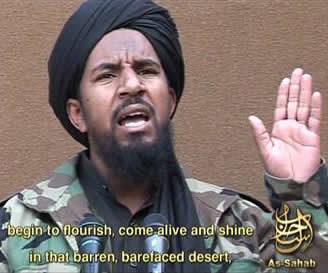 Islamist leader Sheikh Sharif Ahmed on Saturday was elected Somalia's president, leaving him in charge of a fragile peace process aimed at ending 18 years of civil conflict.
Islamist leader Sheikh Sharif Ahmed on Saturday was elected Somalia's president, leaving him in charge of a fragile peace process aimed at ending 18 years of civil conflict. The young Imam promptly vowed to form a broad government and invited all armed groups in the war-ravaged Horn of Africa nation to join the U.N.-sponsored reconciliation effort.
"Extending a hand"
Sheikh Sharif, who chairs the Islamic Courts Union (ICU), comfortably won the vote held in neighboring Djibouti, only days after the Ethiopian troops who sent him into exile two years ago completed their pullout from Somalia.
He defeated Maslah Mohamed Siad Barre, a general and the son of a former president, in the second round of voting, according to an official tally of some 430 lawmakers' votes.
"We have 293 votes for Sharif Sheikh Ahmed and 126 for Siad," said Hussein Mohamed Jama, head of the presidential electoral commission.
"I declare Sharif Sheikh Ahmed the president of Somalia after winning this election," Parliament Speaker Aden Mohamed Nur said.
In a brief acceptance speech following a vote that ended after 4:00 a.m. (0100 GMT), Sheikh Sharif vowed to reach out to the former transitional government as well as to the Shebab, a hardline offshoot of the ICU which rejects talks.
"Very soon, I will form a government which represents the people of Somalia. We will live peacefully with East African countries and we want to cooperate with them," he said.
"I am extending a hand to all Somali armed groups who are still opposed to this process and inviting them to join us," he added.
Prime Minister Nur Hassan Hussein, long seen as the young cleric's main rival to take the helm of the war-ravaged country, pulled out of the contest after trailing Sheikh Sharif by a massive 160 votes in the first round.
"I am ready to cooperate with whoever is elected to make Somalia a peaceful country," he then said.
The vote by a parliament enlarged earlier this week to include Sheikh Sharif's moderate wing of the Islamist-led opposition started late Friday, after hours of intense discussions between MPs.
Sheikh Sharif, a former geography teacher educated in Sudan and Libya, ran in the election as the head of the Alliance for the Re-liberation of Somalia (ARS), an Islamist-dominated opposition umbrella formed in 2007.

 Islamist groups waging war in Somalia against the country's feeble, foreign-backed Transitional Federal Government (TFG) have been riled by a new fatwa issued earlier this month by self-appointed Somali clerics. A spokesman for the clerics, Sheikh Nur Barud Gurhan, told an October 27 telephone press conference that the clerics issued a six-point fatwa regarding the internal dispute among Islamic Courts Union (ICU) leaders, who are divided over the Djibouti Agreement.
Islamist groups waging war in Somalia against the country's feeble, foreign-backed Transitional Federal Government (TFG) have been riled by a new fatwa issued earlier this month by self-appointed Somali clerics. A spokesman for the clerics, Sheikh Nur Barud Gurhan, told an October 27 telephone press conference that the clerics issued a six-point fatwa regarding the internal dispute among Islamic Courts Union (ICU) leaders, who are divided over the Djibouti Agreement.  There is no ceasefire between the forces of the Islamic Courts Union and Ethiopians, says chairman of the Somali opposition groups.
There is no ceasefire between the forces of the Islamic Courts Union and Ethiopians, says chairman of the Somali opposition groups.  On June 22, 2008, Islamist websites posted a video message by Al-Qaeda commander in Afghanistan
On June 22, 2008, Islamist websites posted a video message by Al-Qaeda commander in Afghanistan  Somalia's Prime Minister on Monday accused insurgents of trying to 'spoil' a truce deal signed last month between Mogadishu and its political foes as he condemned the killing of a top UN official in the capital on Sunday.
Somalia's Prime Minister on Monday accused insurgents of trying to 'spoil' a truce deal signed last month between Mogadishu and its political foes as he condemned the killing of a top UN official in the capital on Sunday. (SomaliNet) A hardline Somali Islamist leader accused of ties with Al-Qaeda on Monday chided Saudi Arabia for backing a UN-sponsored Somali truce he charged was a plot to attract the oil-rich kingdom's cash. "We love the Saudis and
(SomaliNet) A hardline Somali Islamist leader accused of ties with Al-Qaeda on Monday chided Saudi Arabia for backing a UN-sponsored Somali truce he charged was a plot to attract the oil-rich kingdom's cash. "We love the Saudis and  (SomaliNet) After a brief halt
(SomaliNet) After a brief halt